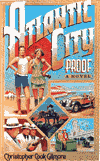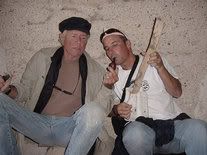A Salute to the Captain.
 Ron had sworn to get everybody drunk, as that was the Captain's wish, and as I stepped into the library of Shakespeare & Co Bookstore, I could see Ron abiding by his promise. The seemingly tiny room of the Tumbleweed Hotel was bustling with people, some of the usual smiling faces, the usual inebriated, the usual bystanders and some welcome new. The thread that bound us all was, we were there to pay our respects to the Late Mr. Christopher Cook Gilmore, better known to all his friends as 'Captain'.
Ron had sworn to get everybody drunk, as that was the Captain's wish, and as I stepped into the library of Shakespeare & Co Bookstore, I could see Ron abiding by his promise. The seemingly tiny room of the Tumbleweed Hotel was bustling with people, some of the usual smiling faces, the usual inebriated, the usual bystanders and some welcome new. The thread that bound us all was, we were there to pay our respects to the Late Mr. Christopher Cook Gilmore, better known to all his friends as 'Captain'.The minute I stepped off the last wooden step onto the floor of the children's section of the bookstore, I could hear Anita, the captain's wife, announce,"Guys, please have some more wine, we've got plenty of it on the table outside."
There was still a minute or two for the 26th April 2005, 7o'clock memorial to begin for Captain Cook. With a copy of the Captain's autobiography in one hand, all set for the reading, Ron gestured me with his cupped palm, beckoning me to grab a bottle of TsingTao Beer. Anita Gilmore stood up to pay her last respects to her dear departed husband, for one last time at the bookstore, Shakespeare and Company, the place where the Captain had spent a majority of his traveling life, meeting people, writing poems, and books, and experiencing a world that cannot be explained in mere words.
What thoughts breezed through Anita's mind when she started to talk about her husband, we shall never know. The moist eyes held back a fond tear, and the words poured from her heart. She recounted the Captain's stories and stay in Paris, his encounters in and around the bookshop, and their previous memorial that they had in Morocco.
...and here in this jar, we have the Captain amongst us,” concluded Anita, carefully supporting the little jar that contained the ashes of the Captain, as she placed it atop the pedestal of books over the benches in a corner. Those ashes evoked many a dear memory, in the minds of those present, and sincere tears of remembrance in the eyes of those who were close to the Captain.
 The fascinating introduction of Captain Cook by Anita, was followed by a short reading by the daughter of George Whitman who is the proprietor of Shakespeare & Co, Sylvia Whitman from the Captain's book, Atlantic City Proof, published in the year 1978. Whilst the reading by Sylvia, the quibble between the characters in the book, Garvey Leek and Minnie Creek, at the onset of their ensuing friendship, reminded the audience of the different facets of the Captain's seafaring nature, and his love for boats. Anita informed the listeners, that the insider story about the book being an honest tribute by the Captain to his passion for boats.
The fascinating introduction of Captain Cook by Anita, was followed by a short reading by the daughter of George Whitman who is the proprietor of Shakespeare & Co, Sylvia Whitman from the Captain's book, Atlantic City Proof, published in the year 1978. Whilst the reading by Sylvia, the quibble between the characters in the book, Garvey Leek and Minnie Creek, at the onset of their ensuing friendship, reminded the audience of the different facets of the Captain's seafaring nature, and his love for boats. Anita informed the listeners, that the insider story about the book being an honest tribute by the Captain to his passion for boats.The room was overflowing with people now, and the wine and beer bottles were floating in the air, being passed over heads from one corner to the other. Ron, a true believer in the Captain, could not help, but shed a tear in his memory. Under Captain Gilmore's aegis, Ron had given up his career in technology, and had taken up world-touring with the Captain. That, according to Ron, was probably the best decision he has ever taken in his entire life, and owed it to his 'guru'. Ron's description of their adventures at sea, at Morocco, had his listeners enchanted with their journeys, held them in awe with their dare-devil stunts, and the same audience were in splits with Ron standing before them, narrating and mimicking the Captain's idiosyncrasies.
Jonathan, who has devoted 2 years of his life to the well-being of the bookstore, recited the poem, 'The Raven', by Edgar Allan Poe as a mark of respect to Mr. Chistopher Cook Gilmore. Jonathan informed us, that his younger brother was a good friend of the Captain. The two of them used to sit in the cafe nearby, Cafe Leffe, and have bouts of discussion, play chess with ideating thought pawns, and enjoy their beverage. I would commit the poem to memory, but Jonathan had everybody in giggles, and chuckles, with a splendid recital of the said poem, which he had committed to his soul. The words poured with a rhythmic cadence, and had the people were mouthing the words with him.
Mr. Edward, who knew Captain Gilmore from his drug days, recounted a flat race event that took place inside the prison where Captain Gilmore was held in custody for more than a year, for illegal possession of hashish. Mr. Edward told everybody about a record breaking racing event; the results of the race were not acceptable to the jail authorities as it was an unofficial event. Ron chipped in, by mentioning how the Captain was unbashful of telling his war stories as well as his prison stories. “The Captain was against any kind of violence, so war was an improbability.” said Ron.
Mary Varme, a long standing friend of Mr. Gilmore, recited the beautiful 'The love song of J. Alfred Prufrock', composed by T. S. Eliot. Ms. Varme read the poem with quivering thoughts about her dear departed friend, a poem that saluted her friend in the best way possible.
 Ricardo, who has been a visiting member of the Tumbleweed Hotel for quite sometime now, had been introduced to the Captain in the year 2001. Ricardo recited an Italian poem by Pier Paolo Pasolini, translated into English for the benefit of the audience. The poem, 'The lament of the excavator', was much appreciated and lauded by those present.
Ricardo, who has been a visiting member of the Tumbleweed Hotel for quite sometime now, had been introduced to the Captain in the year 2001. Ricardo recited an Italian poem by Pier Paolo Pasolini, translated into English for the benefit of the audience. The poem, 'The lament of the excavator', was much appreciated and lauded by those present.Mr. Raman, a good friend of Mr. Gilmore, recounted the times that he spent with the Captain. Mr. Raman also recited a poem in his language, the words that not many could understand, but with a depth that touched everybody deep within.
The curly haired man, Mr. Mark Lipman, recited a poem about marvelous shooting stars, harking down the memory about the sporadic returns of the Captain to Paris; Mark fondly spoke aloud his memories about how the Captain wrote letters and kept in touch with his father, amidst his travels. Mark also quoted the Captain words, “'...stop writing about life, and start living it...'” The Captain was a witness to the numerous aspiring writers who had lived at Shakespeare and Co. before proceeding onto their journey of life.
After Ron finished reading Mr. Christopher Cook Gilmore's autobiography, written in 1984, whence he was staying at the bookshop, Anita asked everybody to refill their glasses to hear a lovely poem, which they referred to as 'The Greatest Poem' ever written. After a singing a lovely song, Ron gave us an insight into the origin of this poem, about how the Captain used to add a line or two every time he visited Paris. Anita had us astonished by the fact that the poem was written over a period of 31 years, beginning in 1969.
The poem, titled, 'Paris Blues', got some people nostalgic about their days with the Captain. The poem reflected the thoughts of people staying at the bookstore, when the poem talked about having infrequent showers, wearing unwashed clothes, a walk across to Notre Dame, the hungry sleep, the 'oh' for those Paris girls and many more little incidents that group together giving the big picture about the blues that one faces in the city of Paris.
The recital of the poem concluded the memorial reading for the Captain; Anita invited everybody to join her in the sprinkling of her husband's ashes into the river, La Seinne that flows under the bridge that one walks from the bookshop to get to the Notre Dame cathedral. We all walked down to the river with the bottles of wine and beer. Anita scattered the ashes from the jar into the river, as a boat filled with sand passed by; friends had begun throwing a bit of wine in the general direction of the flowing ashes, and cheering the Captain and his memories, with songs and laughter.
 Everybody returned back to the bookshop, arranged the benches outside, and sat down together with more bottles of wine, singing Elvis songs, smoking a joint, eating Greek food and making merry, just as the Captain would have wanted it to be. Amongst all the tears and laughter, with the surge of colorful emotions in the environment, with the wine pouring from the rim of the bottles, it almost seemed that we had relivened a special moment of being with the Captain.
Everybody returned back to the bookshop, arranged the benches outside, and sat down together with more bottles of wine, singing Elvis songs, smoking a joint, eating Greek food and making merry, just as the Captain would have wanted it to be. Amongst all the tears and laughter, with the surge of colorful emotions in the environment, with the wine pouring from the rim of the bottles, it almost seemed that we had relivened a special moment of being with the Captain.Captain Cook lived life to the fullest, traveled the world over, lived in over 14 countries, sailed in a boat that he built, wrote books, served time, slept under the bridges, smoked dope, drank beer, took the bull by his horns, and gave a lot of people the mantra to live, and not just exist.
 Our friend, the Captain, expired on July 1st 2004, due to a serious malignant ailment, but continues to remain in our hearts, where he will be cherished fondly, forever.
Our friend, the Captain, expired on July 1st 2004, due to a serious malignant ailment, but continues to remain in our hearts, where he will be cherished fondly, forever. A friend of mine came round for a cup of tea after work and confirmed what I had suspected: Tadpole has a broad Yorkshire accent. Short 'a' sounds (bath, glasses), nice Yorkshire 'u' sounds (mummy) and little phrases ('come 'ere!') that wouldn't be out of place in
A friend of mine came round for a cup of tea after work and confirmed what I had suspected: Tadpole has a broad Yorkshire accent. Short 'a' sounds (bath, glasses), nice Yorkshire 'u' sounds (mummy) and little phrases ('come 'ere!') that wouldn't be out of place in  ““Dude, Is that all what you got for the trip, fucker,” Joshu exclaimed, looking at Brad's tiffin carrier, mentally comparing the teeny parcel with his V.I.P suitcase and an extra baggage, lunging at his shoulder.
““Dude, Is that all what you got for the trip, fucker,” Joshu exclaimed, looking at Brad's tiffin carrier, mentally comparing the teeny parcel with his V.I.P suitcase and an extra baggage, lunging at his shoulder. Pushing his weight onto one leg, resting his right hand on his hip, lurching it forward a bit, Avi was toying with his short growth of beard, pondering over a residential matter with the bespectacled Ralph. Nick was hyper-excited as usual, and was beginning to mutter curses about the tardiness of the Bombay local trains, a minute after their arrival onto the platform.
Pushing his weight onto one leg, resting his right hand on his hip, lurching it forward a bit, Avi was toying with his short growth of beard, pondering over a residential matter with the bespectacled Ralph. Nick was hyper-excited as usual, and was beginning to mutter curses about the tardiness of the Bombay local trains, a minute after their arrival onto the platform. Unfortunately for the passengers who were traveling with the group, everybody got into high spirits, and not just idiomatically; the group with their 'mellifluous' vocal-cords had begun singing enthusiastically. For those of you who know how ridiculous the song 'Banno teri ankiiyaan...' and for those of you who know Joshu as well, can very well understand the plight of the befuddled old man, when that song was being boomed into his tympanic membranes by Joshu, cupping his hands around the old chap, as if he were leaking out a gross secret. The song was not a secret, but gross nevertheless. It shall always remain a secret, whether the old man ever led a normal life after that night.
Unfortunately for the passengers who were traveling with the group, everybody got into high spirits, and not just idiomatically; the group with their 'mellifluous' vocal-cords had begun singing enthusiastically. For those of you who know how ridiculous the song 'Banno teri ankiiyaan...' and for those of you who know Joshu as well, can very well understand the plight of the befuddled old man, when that song was being boomed into his tympanic membranes by Joshu, cupping his hands around the old chap, as if he were leaking out a gross secret. The song was not a secret, but gross nevertheless. It shall always remain a secret, whether the old man ever led a normal life after that night.  “Is anybody interested in 'chai'?” Lalit enquiringly looked at all the faces, finally meeting Ralph's eyes, who agreed to get down onto the platform where the train had halted. It was early in the morning, the normal chirping of the birds was drowned in the 'tring-tring' sounds made by the cold-drinks vendors. The sweet aroma of tea was awakening everybody in the train. It was a long halt, as the train had reached a spot on the tracks where just one train could pass by. It was a scheduled stop, so nobody grumbled, instead everybody decided to get off the platform and have a good stretch.
“Is anybody interested in 'chai'?” Lalit enquiringly looked at all the faces, finally meeting Ralph's eyes, who agreed to get down onto the platform where the train had halted. It was early in the morning, the normal chirping of the birds was drowned in the 'tring-tring' sounds made by the cold-drinks vendors. The sweet aroma of tea was awakening everybody in the train. It was a long halt, as the train had reached a spot on the tracks where just one train could pass by. It was a scheduled stop, so nobody grumbled, instead everybody decided to get off the platform and have a good stretch.  The house locator was Ralph who had the address to the bungalow, where the guys would be camping throughout the trip. However, it was difficult to find out where the gang was dropped at by the driver. Those palm trees in almost every direction did not aid their sense of direction. The calm ocean waves were inviting, beckoning the guys to jump in and the azure sky was lulling everybody to sleep. Nick decided to move their baggage and shove everybody into the shade before proceeding any further, in the scorching sun. The smokers decided to take a small break before starting to walk. The first group consisting of Nick, Lalit, Lij and Ralph moved on with their bags.
The house locator was Ralph who had the address to the bungalow, where the guys would be camping throughout the trip. However, it was difficult to find out where the gang was dropped at by the driver. Those palm trees in almost every direction did not aid their sense of direction. The calm ocean waves were inviting, beckoning the guys to jump in and the azure sky was lulling everybody to sleep. Nick decided to move their baggage and shove everybody into the shade before proceeding any further, in the scorching sun. The smokers decided to take a small break before starting to walk. The first group consisting of Nick, Lalit, Lij and Ralph moved on with their bags.  I walked out of FranPrix, a local supermarket, a stone's throw from my place of work, grabbing 2 chicken sandwiches and a bag of tortilla chips. I had planned on eating in the privacy of my air cubicle, at my work-station. I was feeling quite proud about not having succumbed to the pressure of smoking, over the weekend that had just scampered by. The thinker by the road, lay in shambles, with his adamantly dirty coat covering his head, a needle by his side, and crumbs of bread strewn around his limp hand.
I walked out of FranPrix, a local supermarket, a stone's throw from my place of work, grabbing 2 chicken sandwiches and a bag of tortilla chips. I had planned on eating in the privacy of my air cubicle, at my work-station. I was feeling quite proud about not having succumbed to the pressure of smoking, over the weekend that had just scampered by. The thinker by the road, lay in shambles, with his adamantly dirty coat covering his head, a needle by his side, and crumbs of bread strewn around his limp hand. And then something happened...
And then something happened... This happened on the third date, and we hadn't got to the 'let's go home' thing. In fact, I was mentally prepared not to make it to the fourth date, because I was finding it difficult to find interesting facets about my date, and making conversation with guesses is not easy.
This happened on the third date, and we hadn't got to the 'let's go home' thing. In fact, I was mentally prepared not to make it to the fourth date, because I was finding it difficult to find interesting facets about my date, and making conversation with guesses is not easy. "What in the world was a dignified laborer doing in the metallurgical sciences section of the public library? It was the Reference Section that I met Donna, or was it Dirty_Donna? I could understand Anatomical Sciences, but Metallurgy for Heaven's sake! I ran through my checklist of top 100 things-to-do in my life before I started with the 101st one, whether dating a body-waiter was one of them. I didn't realize that I was using my chopsticks to knit a sweater with the noodles, by then.
"What in the world was a dignified laborer doing in the metallurgical sciences section of the public library? It was the Reference Section that I met Donna, or was it Dirty_Donna? I could understand Anatomical Sciences, but Metallurgy for Heaven's sake! I ran through my checklist of top 100 things-to-do in my life before I started with the 101st one, whether dating a body-waiter was one of them. I didn't realize that I was using my chopsticks to knit a sweater with the noodles, by then. "The earth revolves around the sun in about 365 days. One day has 24 hours in it, an hour has 60 minutes in it, and a minute has 60 seconds in it. The physical concept of time has been quantified and sealed. Defining a second in terms of the movement of the planet around the solar power does seem to be the best way, or is it?
"The earth revolves around the sun in about 365 days. One day has 24 hours in it, an hour has 60 minutes in it, and a minute has 60 seconds in it. The physical concept of time has been quantified and sealed. Defining a second in terms of the movement of the planet around the solar power does seem to be the best way, or is it?
